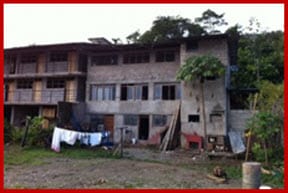Indeed, whether in the Peruvian jungle or at the Mount Everest base camp, Medcor is there for more than 170 worksites, including factories, distribution centers, studios, farms, and mobile or temporary units
Click Link to Access Free PDF Download
“The 6-Step Process To Determine Workers’ Comp Injury Causation”
Founded in 1984 by CEO, Philip Seeger and COO Ben Petersen, Medcor operates many onsite clinics across the United States to support employers who want to control costs, improve outcomes, provide rapid medical response when it is really necessary and avoid claims when they are not necessary – and this means planning ahead even when the worksite is far from the typical office.
Not your typical day at the office for Medcor team members in Peru where they are setting up a remote clinic to support research scientists. From left, Phillip Seeger, Medcor founder and CEO and Dave Matthias, risk manager for the San Diego Zoological Society.
There are also a variety of other similar companies that provide remote medicine services. Many of them are highly specialized, focusing on evacuations, off-shore oil rigs, pipelines or military bases.
Medcor Executive Vice President Curtis Smith notes there are at least eight benefits of having an onsite clinic for employers with remote locations:
- Improved medical outcomes for employees and workers onsite.
- Improved morale and confidence for employees and workers onsite (which, in turn supports recruiting and retention at the remote site).
- When done properly, remote medical crews reduce costs and liability.
- Avoids unnecessary travel costs by resolving cases on site.
- Better screening and monitoring of on-site staff, including early intervention of injuries and illness.
- For patients who do need evacuation, there is better planning, stabilization, prep, and continuity of care that helps reduce complications. For example, on the Amazon trip, a scout team discovered other river evacuation routes for emergencies before they happen.
- There is less litigation because outcomes are better, documentation is better, and the employer is more likely to be in compliance with applicable laws and best practices.
- It is morally the right thing to do.
Benefits may extend further for U.S.-based companies including compliance with U.S.-based workers compensation and other laws which are likely to be claimed as an applicable standard for expat employees and the parity of service/benefits with other employees who are not in remote locations.
Author Rebecca Shafer, JD, President of Amaxx Risks Solutions, Inc. is a national expert in the field of workers compensation. She is a writer, speaker, and website publisher. Her expertise is working with employers to reduce workers compensation costs, and her clients include airlines, healthcare, printing, publishing, pharmaceuticals, retail, hospitality, and manufacturing. See www.LowerWC.com for more information. Contact: RShafer@ReduceYourWorkersComp.com.
Our WC Book: http://www.wcmanual.com
WORK COMP CALCULATOR: http://www.LowerWC.com/calculator.php
MODIFIED DUTY CALCULATOR: http://www.LowerWC.com/transitional-duty-cost-calculator.php
WC GROUP: http://www.linkedin.com/groups?homeNewMember=&gid=1922050/
SUBSCRIBE: Workers Comp Resource Center Newsletter




























